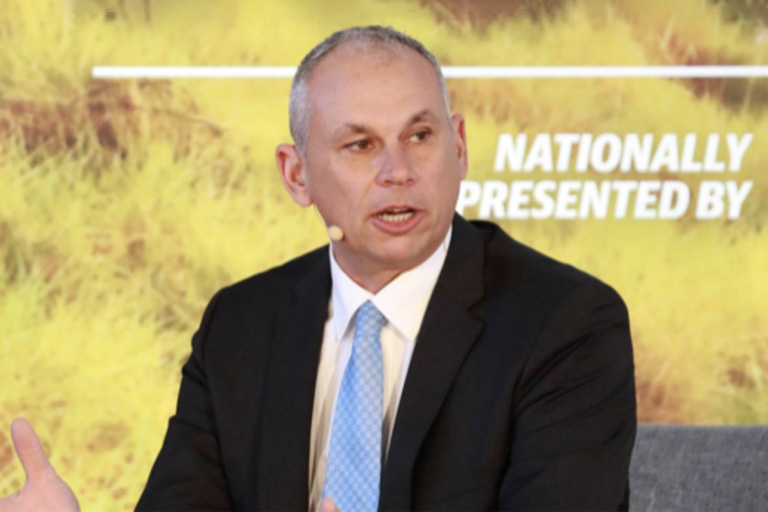Bush Summit: Wind farms facing revolt from farmers
Governments and wind farm developers could face stiff opposition from farmers amid growing concern that large-scale projects could change the landscape for the worse, former Northern Territory chief minister Adam Giles says. Mr Giles – now the chief executive of Gina Rinehart’s two key farming businesses, Hancock Agriculture and S. Kidman and Co – told The Australian’s Bush Summit in Perth on Monday that the transition to net zero was being felt as a “blunt instrument” in regional Australia.

Article by Paul Garvey courtesy of the Australian.

Governments and wind farm developers could face stiff opposition from farmers amid growing concern that large-scale projects could change the landscape for the worse, former Northern Territory chief minister Adam Giles says.
Mr Giles – now the chief executive of Gina Rinehart’s two key farming businesses, Hancock Agriculture and S. Kidman and Co – told The Australian’s Bush Summit in Perth on Monday that the transition to net zero was being felt as a “blunt instrument” in regional Australia.
Landowners – especially in regional NSW, Victoria, Queensland and South Australia – were concerned about what the rollout of major wind and solar farms, and associated transmission lines, could mean for their own land and surrounding communities.
“Net zero, it’s coming on to the agriculture sector like a blunt instrument, and wind power and transmission lines are the big thing,” Mr Giles said.
“Landowners (are) worrying about what the wind turbines and transmission lines are doing. That’s going to be a big issue for the net-zero roll-out.”
Mr Giles said one of the main concerns was the way the roll-out of wind turbines and associated infrastructure was being orchestrated, calling for governments to give greater consideration to regional perspectives.
Beyond the physical impact on the landscape, Mr Giles said there were other issues around the sourcing of critical components for turbines and their recyclability.
“With 25 million people in Australia now, I can see the day there’s 50 million people and the whole country is littered with wind towers and transmission lines everywhere,” he said.
Federal Resources Minister Madeleine King said the energy transition represented a huge opportunity for regional Australia – not just in lithium, cobalt and rare earth earths but also in established sectors such as iron ore, gas and metallurgical coal.
“All are essential for clean-energy technologies,” she said. “The global energy transition now under way presents us with a priceless opening to grow our resources industry, boost our value-adding capabilities and contribute meaningfully to global decarbonisation.”
The mining and oil and gas sectors have largely embraced the opportunities around the energy transition. Mining companies are enjoying a boom for so-called battery and critical minerals that will be needed for applications such as wind turbines, batteries and electric vehicles, while the oil and gas sector is promoting gas as a transitional fuel away from coal.
It has also been advocating for carbon capture and storage as a way to reduce the industry’s footprint while maintaining supply.
Chamber of Minerals and Energy of WA chief executive Rebecca Tomkinson said net zero was a major opportunity for the state, given the minerals needed for renewable energy projects.
“We need to double down on the mining efforts. We need twice as much cobalt, twice as much copper, twice as much nickel. We need more mining than we’ve ever seen before,” she said.
“We need more mines in rare earth and critical minerals not just for the prosperity of our nation, but as the world moves towards a net-zero future.”
Australian Petroleum Production and Exploration Association chief executive Samantha McCulloch repeated her call for the establishment of net-zero zones that would see greater co-ordination between industries and technologies on decarbonisation.
“We can work across industries and across shared infrastructure and look at how we can accelerate that pathway to net zero and make it more efficient and economical,” she said.
In her speech, Mrs Rinehart highlighted the challenges facing agricultural businesses that did not have the same resources to meet climate-change commitments.
